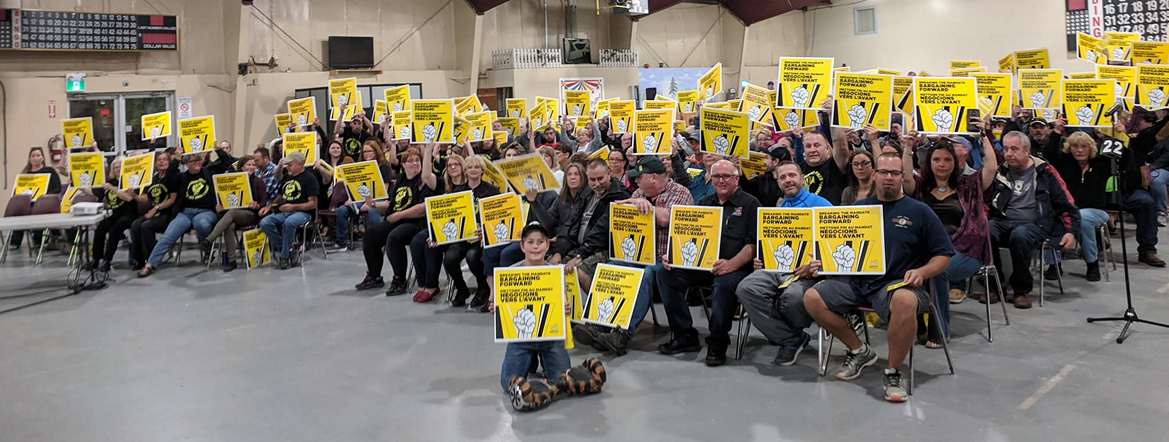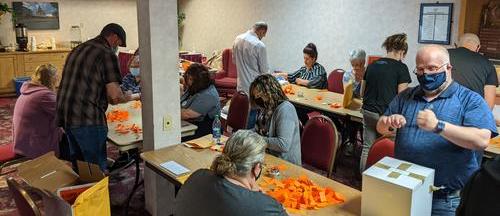|
October 15, 2021 - No. 95
New Brunswick Public Sector Workers Have Solutions to
Problem of Retention and Recruitment
Workers Step Up Their Fight Under Conditions of Renewed COVID-19 Crisis 
March in Fredericton, August 28, 2021, supports frontline workers.
• Workers Band Together for Collective Action to Ensure They Are Respected and Their Rights Are Upheld
- Interview, Steve Drost
New Brunswick Public Sector Workers Have Solutions to
Problem of Retention and Recruitment

St. John meeting during strike votes, September 22, 2021
The approximately 22,000 workers of the Canadian Union of Public
Employees -- New Brunswick (CUPE NB) have now completed their strike
vote which ended with overwhelming support for strike action if their
demands are not met. Members of the New Brunswick Nurses Union are also
stepping up their fight for their rights and for
services. One of the key demands is for wages that are acceptable to
workers and that will help solve the huge retention and recruitment
crisis that threatens the very existence of services. Workers are now
discussing how to move forward with this important struggle at a time
when the province has declared a health emergency following the
rapid increase in hospitalizations due to COVID-19, including intensive
care hospitalizations, and the increase in deaths due to the pandemic.
Public sector workers are the public's first line of defence, but their
conditions and the government's dictate mean that they are in an
increasingly untenable position to provide services. Despite the
renewed crisis of the pandemic, the provincial government persists in
rejecting the demands of workers and refusing to acknowledge the
problem of the
crisis in services. It continues to claim that meeting the demands of
public service workers will put undue pressure on the province's
finances because, according to this government, serving the province
means paying the rich, including through the privatization of public
services. The Premier said he was prepared to push things to the
brink,
stating that he has already planned contingency measures if workers
decide they have no choice but to take strike action.
Workers' Forum firmly supports the difficult and courageous
struggle of New Brunswick public sector workers for their rights and
for a pro-worker and pro-social solution to the problems facing public
services. We call on all workers in Canada to support them.

- Interview, Steve Drost -

Counting CUPE New Brunswick strike votesSteve Drost is President of the Canadian Union of Public
Employees (CUPE), New Brunswick
Workers' Forum: Can you give us an update on the developments in your fight for the rights of public sector workers?
Steve Drost: We have recently completed our counts,
and out of our 10 locals that represents 22,000 members, we have
received an overwhelming mandate to strike. It
averages 94 per cent across the board, all in the nineties. This
represents sectors in health, education, transportation, tourism,
social services. It is right across
the board in the province.
We really wish that the government negotiators would return to the table.
Unfortunately, they have concessions and we have made it clear we will
not return with concessions on the table. The Premier has been in the
media saying that they are willing to return to the table but the
concessions remain. There's a bit of a stand-off there.
We are now entering a very difficult time again with COVID. Our
numbers are rising quite quickly compared to what New Brunswick had
been experiencing. Our hospital admissions are going up and our ICU
[intensive care units] admissions have increased. We've had more deaths
as of late than we had throughout the whole pandemic. The
government has just put us back in a state of emergency regarding COVID.
As the numbers are really concerning for the province right now, we
issued a notice to the public that we would not withdraw services until
we revisit this on October 22. The locals will still be doing other
actions meanwhile. We just will not be pulling anybody in the health
care sector off the job at this point, because they are in a crisis.
The public greatly appreciates that and so do some managers, and
even the Premier had kind words to say on the radio about the decision
we made. So we are trying to manage the pandemic, but we have 22,000
workers who have given their bargaining team and the centralized
bargaining committee, which represents all 10 locals, a very clear
mandate that they are prepared to walk off the job to achieve fair
wages and a fair contract.
It's getting very difficult, but our members are very positive and
the membership's engagement has been very strong. Women and men on the
ground have been very clear that they cannot work under these
conditions anymore. We've got serious retention and recruitment crises
and any kind of COVID recovery program has to involve
investments in public services and paying public sector workers
properly.
 I
can give you two very direct examples of problems of retention and
recruitment at this time. In the nursing homes, which are part of CUPE,
out of some fifty nursing homes, they have over 400 vacant positions.
There was a situation just a few weeks ago that in one of the nursing
homes which should have had 18 staff on duty there were only five. In a
different union, the New Brunswick Nurses Union, they have 1,000 vacant
positions. I
can give you two very direct examples of problems of retention and
recruitment at this time. In the nursing homes, which are part of CUPE,
out of some fifty nursing homes, they have over 400 vacant positions.
There was a situation just a few weeks ago that in one of the nursing
homes which should have had 18 staff on duty there were only five. In a
different union, the New Brunswick Nurses Union, they have 1,000 vacant
positions.
There have been too many austerity cuts over the last 20 years to
our health care system. It was actually teetering on the edge of a crisis
before the pandemic and it has just made matters that much worse.
Our workers are and have been, since the beginning, the first line
of defence for the people of New Brunswick against the pandemic.
Our workers are tired, concerned and they are very frustrated with this
government for having to go down this road. They want to be treated
with dignity and respect and sign a collective agreement that is good
for all parties.
The fact is that the government came to the table with a 1.25 per cent per year wage offer for
four years and then it offered two per cent per year for the next two
years, because it wanted a six-year contract. These groups have never
entertained contracts longer than four years. And even with the two per
cent, the wage offer does not even touch the cost of living. Some of
our members are amongst the lowest paid public sector workers in
Canada. This wage offer would work out to about $30 a week gross and
some of these workers have been without a contract for between three
and five years. And this is on top of what happened two contracts ago,
when the government first came in with wage freezes of zero per cent,
zero per cent, two per cent, two per cent for four years and then, in
the next contract, another wage freeze of one per cent a year for four
years. At a minimum, public sector workers lost 10 per cent of their
purchasing power over these years because wages have not kept up with
the cost of living.
We feel that what the Premier is doing is very reckless,
but we feel that it's also very calculated. We feel that he's targeting
our union because our workers are fed up and have decided to draw a
line in the sand and say enough is enough.
WF: So what is going to happen now?
SD: Our 10 teams are going to make a decision on
October 22. They have been getting together since Thanksgiving Day, on
October 11. They are looking at
what kind of actions can be organized without pulling people off the job. For example, the presidents are
advising all the workers that it is necessary that they fulfill their
contractual obligations, but not do anything outside of the contract.
We have not felt this kind of unity and solidarity in many years.
Although it's a difficult time, it's also a very proud time to be
working with CUPE and with the whole labour movement in New Brunswick.
The workers have been amazing for what they have gone through with
the pandemic, and now for banding together for collective action to
ensure that their rights are going to be upheld and respected.
We want this Premier to come back to the table and treat this group with the respect that they deserve. 
(To access articles individually click on the black headline.)
PDF
PREVIOUS
ISSUES | HOME
Website: www.cpcml.ca
Email: office@cpcml.ca
|

